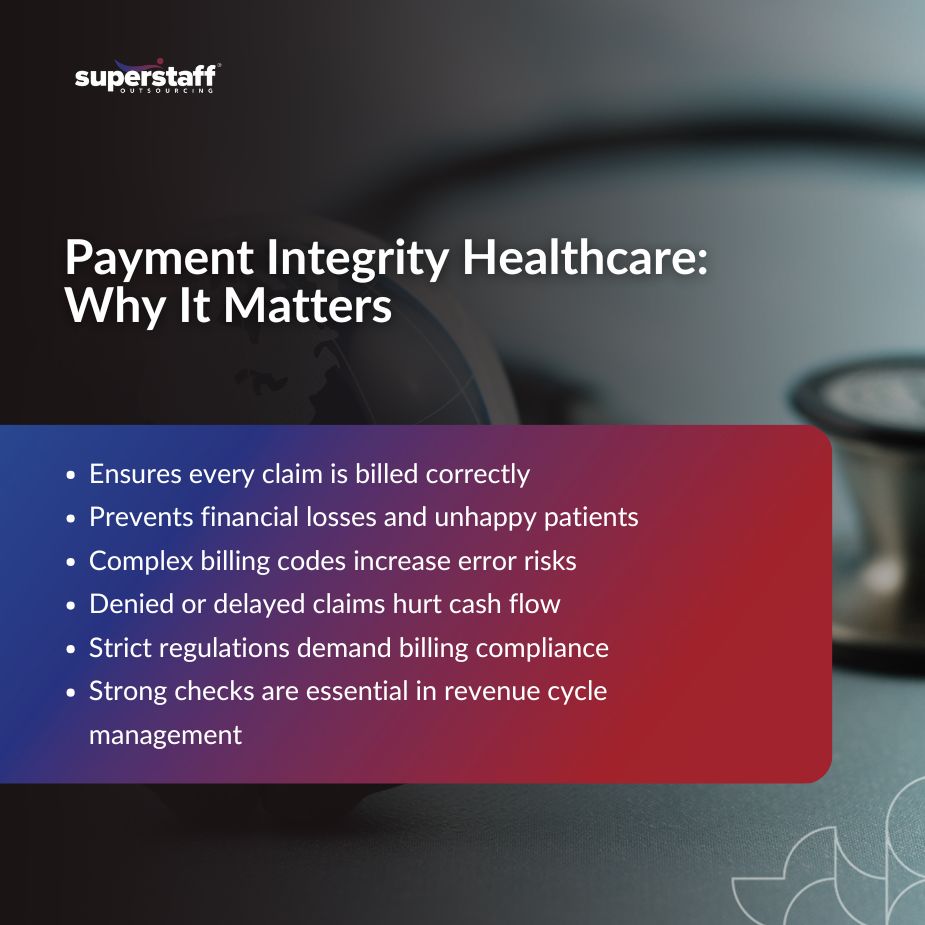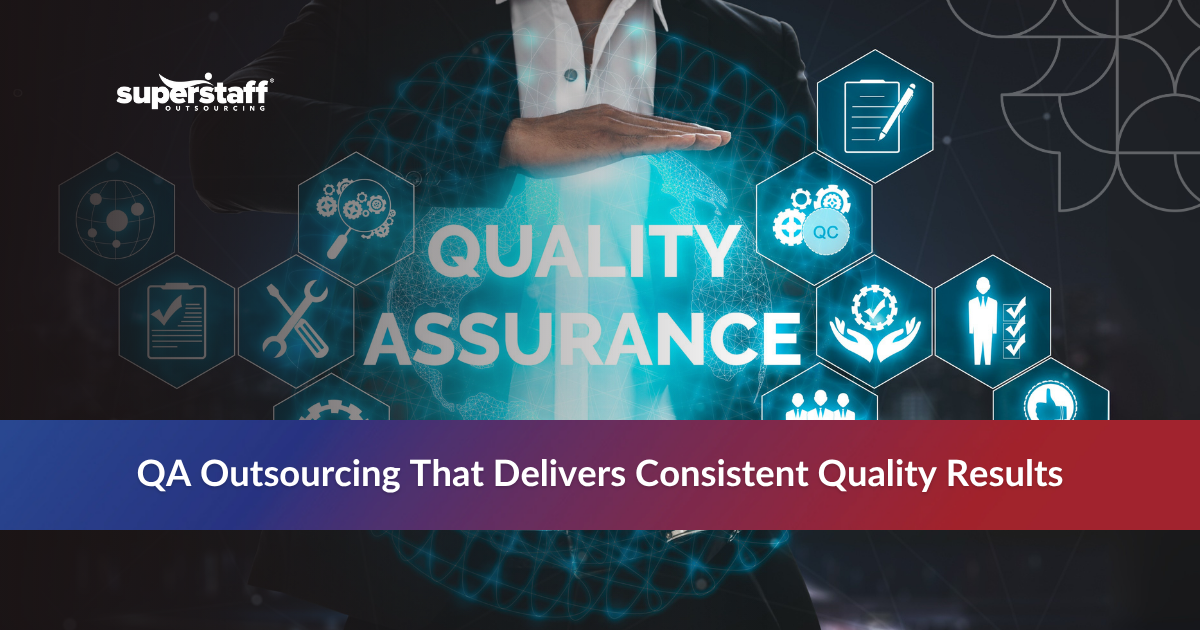
Payment integrity in healthcare is a growing concern for providers trying to maintain financial stability and billing accuracy. Many healthcare organizations are dealing with billing mistakes, denied claims, and rising administrative costs. These problems directly affect how providers are paid and how patients are billed.
With the growing complexity of healthcare payments, leaders are asking: Which model works best for healthcare payment accuracy? Should they manage payment integrity in-house or work with external partners?
Understanding the differences between insourcing and outsourcing payment integrity can help healthcare organizations make better decisions. This article outlines the strengths and limitations of each approach and provides clear, practical insights for choosing the right model based on your organization’s goals and resources.
Why Payment Integrity Healthcare Matters

Payment integrity healthcare is about making sure every claim is billed correctly and every dollar is accounted for. Mistakes in this area lead to financial losses and unhappy patients. Here’s why it’s a growing focus:
- Complex billing codes and payer rules make errors more likely.
- Denied or delayed claims slow down cash flow and raise costs.
- Strict regulations require healthcare providers to stay compliant with billing practices.
Because of these issues, revenue cycle management strategies must include strong checks at every step of the payment process.
Insourcing Payment Integrity: What You Gain From Keeping It In-House
Some healthcare providers prefer to keep their payment integrity healthcare work internal. There are clear reasons why:
1. Direct Oversight
Internal teams can track and manage processes daily, making it easier to respond quickly to issues and implement changes when needed. This close supervision helps ensure accuracy and reduces the chance of errors going unnoticed.
2. Tailored Workflows
In-house staff follow processes that match the organization’s specific needs, so there is no need to adjust to an outside partner’s systems or rules. This flexibility allows teams to adapt procedures as priorities shift without delays.
3. Alignment With Culture
Internal teams understand the values and mission of the organization, which helps maintain consistency in how tasks are handled. This shared mindset supports better communication and a stronger commitment to quality.
However, insourcing isn’t always the easiest option. There are important costs and risks to consider.
The Challenges of Insourcing Payment Integrity
Even though insourcing provides control, it may create new pressures for the organization.
1. Staffing and Training Costs
Building a qualified internal team requires time and budget because hiring specialists in payment integrity healthcare is competitive and expensive. This process can slow down operations while the team gets up to speed.
2. Technology Investment
Managing payment accuracy requires reliable systems and tools, which means investing in technology infrastructure. Updates and ongoing support for these systems often require a large financial commitment that can strain resources.
3. Staff Turnover
High turnover is common in healthcare settings, and when trained staff leave, it affects consistency and leads to delays in claims processing. This turnover disrupts workflow and increases costs due to repeated hiring and training.
For example, during a ransomware attack on UnitedHealth’s Change Healthcare unit, many healthcare providers faced significant financial losses. Smaller hospitals and healthcare groups were generally hit harder than large ones, with the smallest U.S. hospital systems still missing 7.6% of revenue from Medicare and Medicaid claims for February.
Due to these challenges, some healthcare providers explore outsourcing as a more flexible approach.
Outsourcing Payment Integrity: A Scalable and Skilled Approach
Many organizations now turn to healthcare revenue cycle outsourcing for help with payment integrity healthcare functions. There are several reasons why this approach is becoming more popular.
-
Specialized Expertise
Outsourcing partners bring years of experience in handling healthcare claims and billing. They maintain up-to-date knowledge of payer rules and regulatory changes, which helps ensure compliance and reduces errors.
-
Flexible Resources
Providers can adjust the level of services based on their current volume, scaling up or down as needed. This flexibility is especially helpful during seasonal peaks or when the organization faces staffing shortages.
-
Tools and Technology
Outsourced vendors often use modern systems designed to improve both speed and accuracy in payment integrity processes. These tools help reduce manual errors and accelerate approval times, which can improve cash flow.
Outsourcing allows healthcare providers to focus more on patient care, but it does come with some trade-offs that need to be considered.
What to Watch Out for When Outsourcing
Healthcare providers should understand the limits of outsourcing before committing.
- Less Direct Control – You may have less visibility into day-to-day operations, which can make issue resolution slower.
- Data Security – Patient and financial data must be protected at all times. Work with vendors that follow strict security protocols.
- Service Quality – Results depend on the reliability of the vendor. If service slips, it can affect billing accuracy and revenue.
Hybrid Models: Mixing Internal and Outsourced Support
Some organizations find that a hybrid model gives them the best of both options. This structure combines in-house control with the external support of a trusted vendor to balance strengths from both sides.
One key benefit of a hybrid model is the ability to keep sensitive tasks in-house while outsourcing high-volume functions such as audits or appeals. This helps maintain security and control over critical areas, while still managing workload efficiently.
Another advantage is the flexibility to adjust outsourcing levels as needed without fully giving up control. Organizations can increase or decrease the amount of work handled externally based on current demands or resources.
A hybrid approach also improves collaboration between internal teams and vendors, which supports greater accuracy and consistency in payment integrity processes. When both sides work closely, it helps reduce errors and streamline communication.
This approach works well for providers who are still deciding which model fits their needs best for healthcare payment accuracy, allowing them to test and adapt as they go.
Finding the Right Fit for Your Organization
Choosing between insourcing, outsourcing, or a hybrid approach depends on many factors, including cost, staffing, and operational needs. The main goal is to improve payment integrity healthcare results by increasing accuracy, reducing delays, and staying compliant.
To recap, insourcing offers control and familiarity but requires more resources to maintain. Outsourcing provides access to experts and advanced technology while offering greater flexibility to adjust as needed. Hybrid models allow organizations to balance internal strengths with outside support, combining the best aspects of both approaches.
Whether you are planning to grow your team or streamline operations, choosing the right model will help support both patient satisfaction and financial results.
SuperStaff helps healthcare organizations manage payment accuracy through smart, reliable outsourcing. From claim reviews to compliance support, our team supports your payment integrity healthcare goals with professionalism and care.
Learn how our healthcare revenue cycle outsourcing services can help reduce costs and improve accuracy. Contact us today to build a better payment process that fits your needs.






